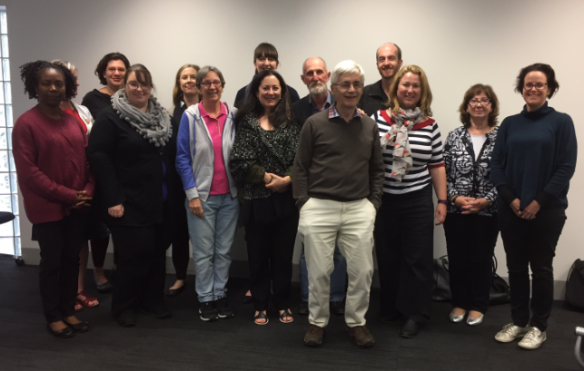 Olivia Rundle’s recent blog post outlined the agenda for the 5th Annual ADR Research Network Roundtable – a unique event for those of us in the ADR research space.
Olivia Rundle’s recent blog post outlined the agenda for the 5th Annual ADR Research Network Roundtable – a unique event for those of us in the ADR research space.
To follow, this blog post offers our view as to why the Roundtable is such a valuable and important event, particularly for those who have not yet participated.
A brief introduction: We are both ‘pracademics’. Rosemary is a Roundtable frequent flyer, while Emma-May was a first time contributor to the conference.
This year the Roundtable was funded by the University of Tasmania (UTAS). Our host, Olivia Rundle, co-ordinated an outstanding programme, including a diverse selection of papers – and typical of Tasmanian hospitality, we did not go hungry!
Picture this: a meeting of like-minded academics, practitioners, ‘pracademics’ (those straddling research, teaching and professional practice) and other ADR professionals, investing their time to workshop academic papers and projects that are in various stages of development.

In the high stakes academic landscape, the Roundtable is an oasis for the encouragement of new approaches and bold research initiatives. This is a generous-spirited environment that is rare for most of us. As Olivia noted in her blog post, the Roundtable offers ‘an opportunity for risk taking and community building’.
This is not a soft space. However, the critique from academic peers is constructive and sensitively delivered. Commentators are driven by the desire to support and encourage their fellow researchers:
- to see their work three dimensionally
- to be thought leaders in the field
- to present their work in a way that demonstrates academic rigour.
While this forum has traditionally been devoted to the non-adjudicative space, this year two papers were welcomed from the adjudicative space – a signal that the ADR Research Network is committed to adopting an inclusive approach to DR research across the DR continuum.
The Hobart Roundtable offered significant challenges and benefits to us both, despite being at very different stages of our professional development. It has enabled us to:
- refine some of our ideas
- enhance our understanding of current research and
- be assured that there is a supportive environment that we can draw upon as we develop our personal research initiatives.
The next Roundtable is planned for 6-8 December 2017 on the Sunshine Coast. We encourage you to apply to participate if:
- You have an idea for future research/academic pursuit and would value the opportunity to workshop your ideas in a safe space with accomplished professionals;
- You seek to build your ADR network; or
- You are a practitioner or making a career transition from practice into the ADR space and want to pursue some research initiatives
Watch this space for blog posts about the papers that made their debut at the 2016 Roundtable…
See you next year!
Emma-May Litchfield and Rosemary Howell

Pingback: DR Conferences in 2017 | The Australian Dispute Resolution Research Network
Pingback: Show Me the Data! Report on the 2017 Civil Justice Research & Teaching Forum | The Australian Dispute Resolution Research Network
Pingback: “Safe and supported”: Developing a model for mediating family violence cases beyond family law | The Australian Dispute Resolution Research Network
Pingback: Show Me the Data! Report on the 2017 Civil Justice Research & Teaching Forum | ACJI Blog
Pingback: “Safe and supported”: Developing a model for mediating family violence cases beyond family law | ACJI Blog
Pingback: “Safe and supported”: Developing a model for mediating family violence cases beyond family law | Themis Says